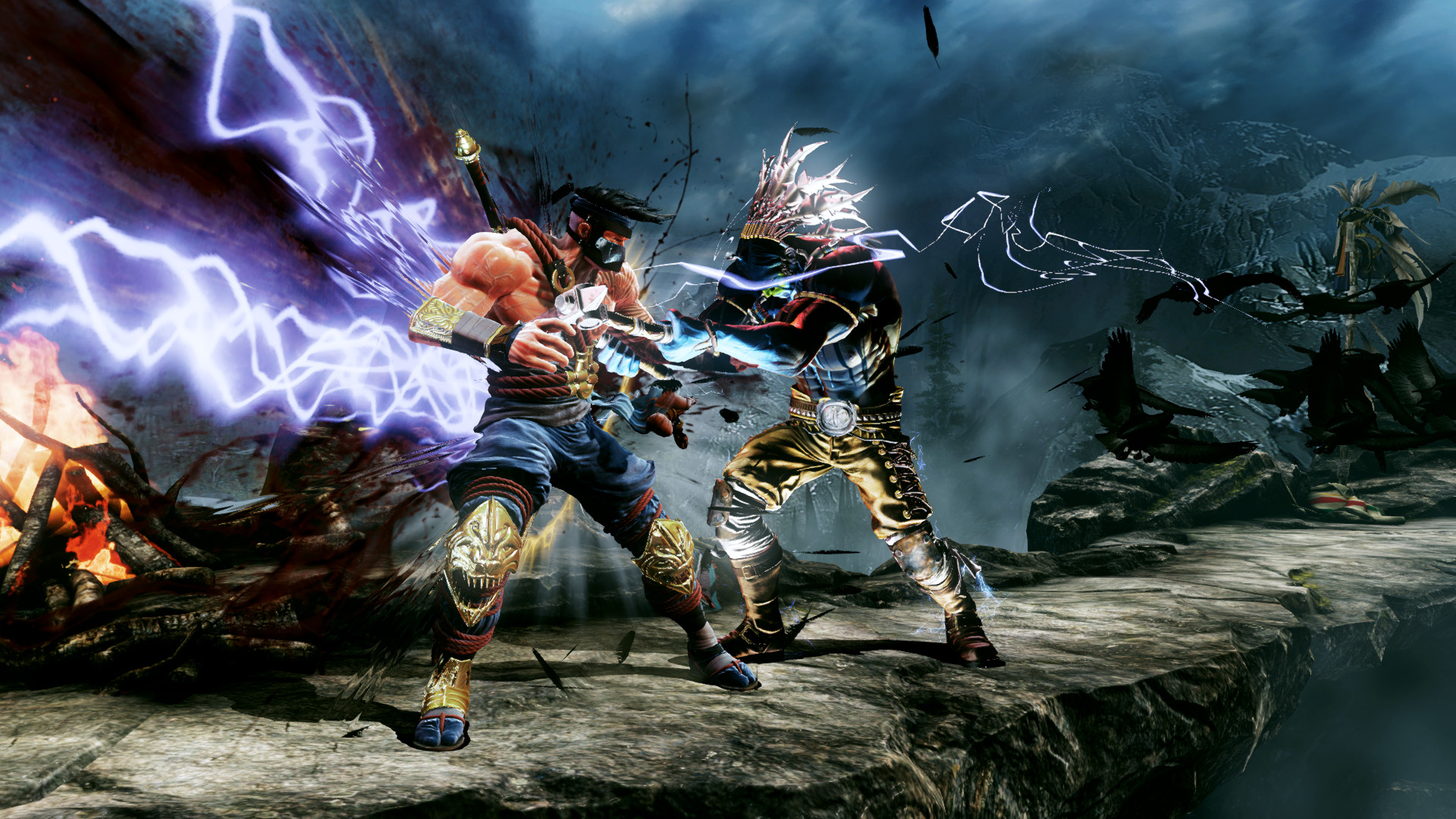GamesRadar+ Verdict
Pros
- +
Incredibly entertaining
- +
thanks to great presentation
- +
Deep mechanics
- +
while still staying accessible
- +
Smooth online play
Cons
- -
Only six fighters at launch
- -
Scarce single-player content
Why you can trust GamesRadar+
Have you ever enjoyed a demo as much as a full game? If the core mechanics are fun enough, even a tiny chunk of a larger whole can provide hours of entertainment. I remember playing the TimeSplitters 2 demo over and over again, totally enamored with exploring every possibility in what little piece of game I was given. It's the same feeling I get playing Killer Instinct, an Xbox One launch game with a scarce amount of content and a wealth of potential. With a mere six characters and incredibly limited options for single-player, KI may initially seem incomplete--but its supreme fundamentals take it so much farther than the sum of its roster.
The Killer Instinct franchise may not be as iconic as Street Fighter or Mortal Kombat, but it's always excelled in one very important field: presentation. The Xbox One reboot keeps that streak going, with vibrant graphics, superb sound design, and a clean, easy-to-read UI. It also has one of the best exciting-moments-per-second ratios I've ever seen in a fighter. KI's gameplay flow is heavy on combos, but it treats long strings of attacks like a two-way street. Instead of having to just sit there and take big damage, you're constantly engaged during every moment of the one-on-one brawls, looking for any opportunity to bust out a combo breaker and reverse the momentum of the match in your favor.
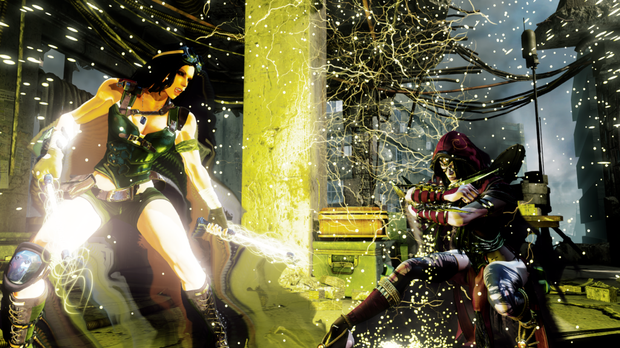
Does the 2.5D fighting scream "next-gen" to any and every onlooker? Not quite--though the action runs at a crisp 60 frames per second, even while particle effects fill the screen, the character models range from amazing to just alright. Frosty alien Glacius and his smooth, icy carapace look incredible in motion, while close-up shots of B. Orchid give her the appearance of a plastic-skinned brunette Barbie doll.
While we're talking about the roster, old-school KI fans may very well tear up at seeing some of their favorites rendered in high-res. The six fighters may look a bit different than you remember, but they're all packed with personality; Sabrewulf's feral rage is palpable, while Thunder has a distinct aura of stoicism about him. More importantly, no two fighters share the same playstyle--which, given the roster's small size, is an absolute necessity. Players looking for the traditional Ryu archetype will gravitate towards the fireball-chucking monk Jago, while spider-woman Sadira (the only newcomer in the bunch) is perfect for those who prefer tricky, nimble agility. No matter your taste in fighter, there's a good chance you'll find someone to love here.
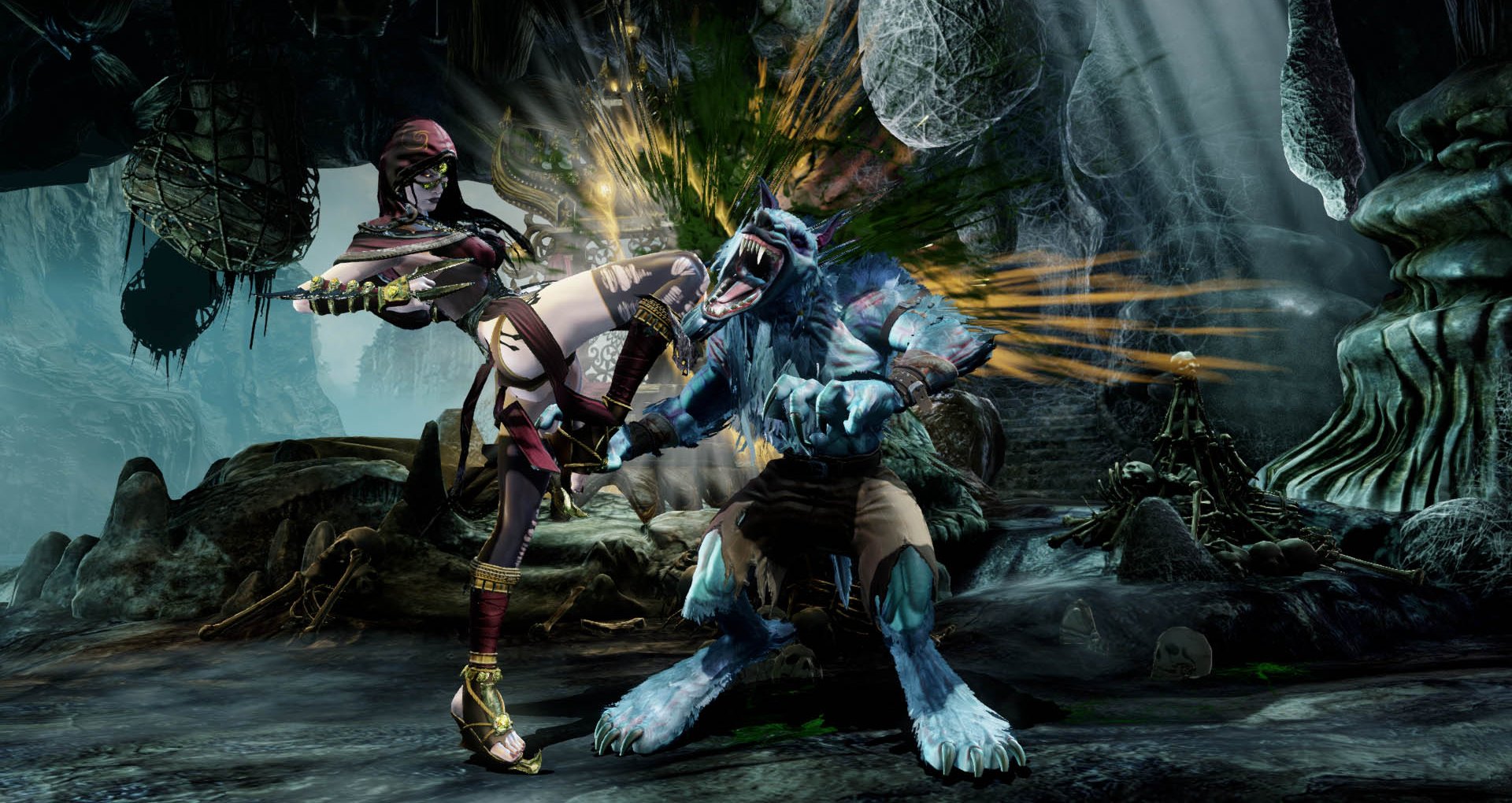
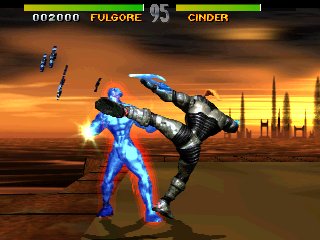
The only valid reason to buy the $40 KI pack is Killer Instinct Classic, an Xbox One port of the original arcade brawler. It's got some decent trimmings, as far as ports go: two authentic ROM versions (one buggy, one refined), some graphical options, and an infinite-life training mode. No online play, sadly. If you don't already know how to play the first KI, Classic does little to teach you, and you'll probably lose interest after 30 minutes of messing around. But if you hold the debut KI close to your heart, it might be worth the extra money--because cruelly, it looks like KI Classic won't be sold separately.
Like all great fighting games, KI is accessible enough for a newcomer while still providing the depth that the hardcore scene craves. Mashing buttons whilst your thumb spasms on the D-pad will actually produce some fairly impressive results, at least at first. You don't need to be a joystick savant to rack up 10-, 20-, even 50-hit combos--but the ease of chaining together attacks is balanced by some ingenious mechanics. With the way KI's auto combos, linkers, and enders work, maximum damage can only be achieved by carefully orchestrating and then "cashing in" your combos. Of course, the longer the combo, the more opportunities your opponent has to unleash a combo breaker. Then again, there's always counter breakers, which reverse the reversal in the flashiest way imaginable. This kind of back-and-forth pace is electrifying, ensuring that there's never a dull moment during a bout.
If you have no idea what I'm talking about, don't worry. Though KI lacks a single-player story to familiarize you with its mechanics, its Dojo tutorial section succeeds in doing something so few fighting games do: actually teach beginners how to play. Complex, genre-specific terminology gets broken down into plain English, and even veterans may learn a thing or two. Study the Dojo's lessons well--partially because they apply to many fighters, but mostly because its the only solo activity of value. KI has no campaign or final boss to speak of; you can spar against cheap AI bots or slog through a droll survival mode, and that's about it. Without some local or online competition, your attention will dwindle faster than Glacius on a hot summer's day.
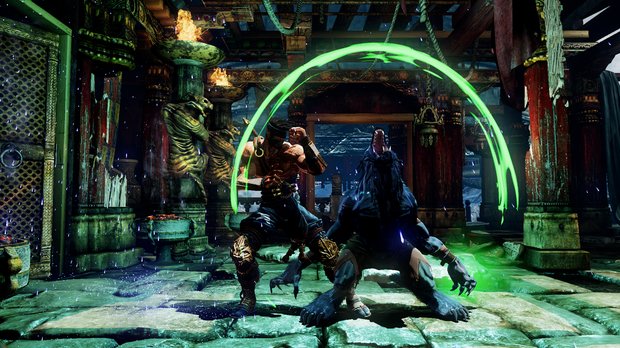
Again, as with any self-respecting fighter, KI's appeal skyrockets when played with a like-minded group of friends. Matches are quick but strategic, flashy while still retaining a classic rock-paper-scissors parity. Playing in front of an audience is exhilarating, largely thanks to KI's magnificent audio. Matches are rife with bone-crunching thumps, pulse-pounding rhythms, and extraordinary finishing combos that will literally be music to your ears. But nothing compares to the enthusiasm of the announcer, whose booming voice puts all the excitement over the top. Hearing him scream the classic "C-C-C-C-COMBO BREAKER!" always makes me giddy, even mid-match. Every time the announcer croaks out a labored, throaty "ULTRAAAAAAAAAAAA!" like a town crier on crack, you'll get chills of satisfaction.
Happily, the action stays just as intense in the online arena. From what I've seen, KI's netcode is smooth and steady; never did I feel a drastic disconnect between my button presses and in-game actions, and not once did lag rear its ugly, fun-ruining head. Your profile can be tweaked as you level up through the various wittily named ranks--all stuff you've probably come to expect from an online fighter. The only thing to be wary of is rage-quitting: If you're utterly humiliating your opponent with a 100-hit combo at the end of a match, there's a good chance they'll bail before you can bask in your glorious victory. You'll still get the win, but the abrupt full stop makes bad sportsmanship that much more irritating.
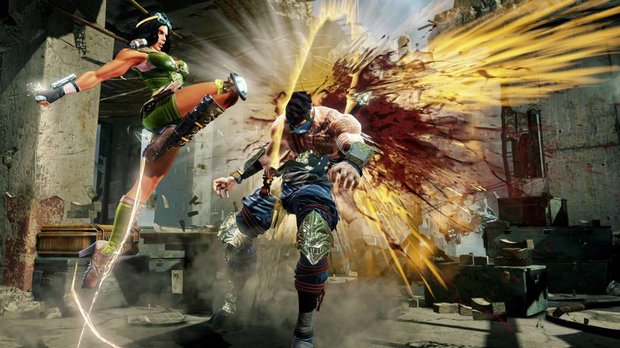
Unless you're a diehard fan of the series, treat KI as a $20 purchase and avoid the $40 bundle. Dropping a 20-spot will give you exactly what you need: a bundle of all six available fighters, plus two more (Spinal and Fulgore) that are coming down the pipe. Technically, you can download the game for no money down, which only gives you access to Jago--a solid entry point, but you'll be craving a wider selection before long. Buying characters for $5 apiece seems like a rip-off, as do the customization items exclusive to the $40 bundle. Interchangeable outfit items do help you stand out from the crowd, but the majority of them look, in layman's terms, dumb as hell.
A year from now, Killer Instinct could be one of the best fighting games ever made. In its current state, it feels like the inherently replayable foundation for something bigger. The general lack of content is made up for by the mind-blowing fun factor, where pick-up-and-play controls meet meticulously crafted game mechanics. And despite the sensation that I've seen everything there is to see, I suspect I'll still be playing KI for months. Because sometimes, an awesome piece of a finished product is all you need to enjoy yourself.
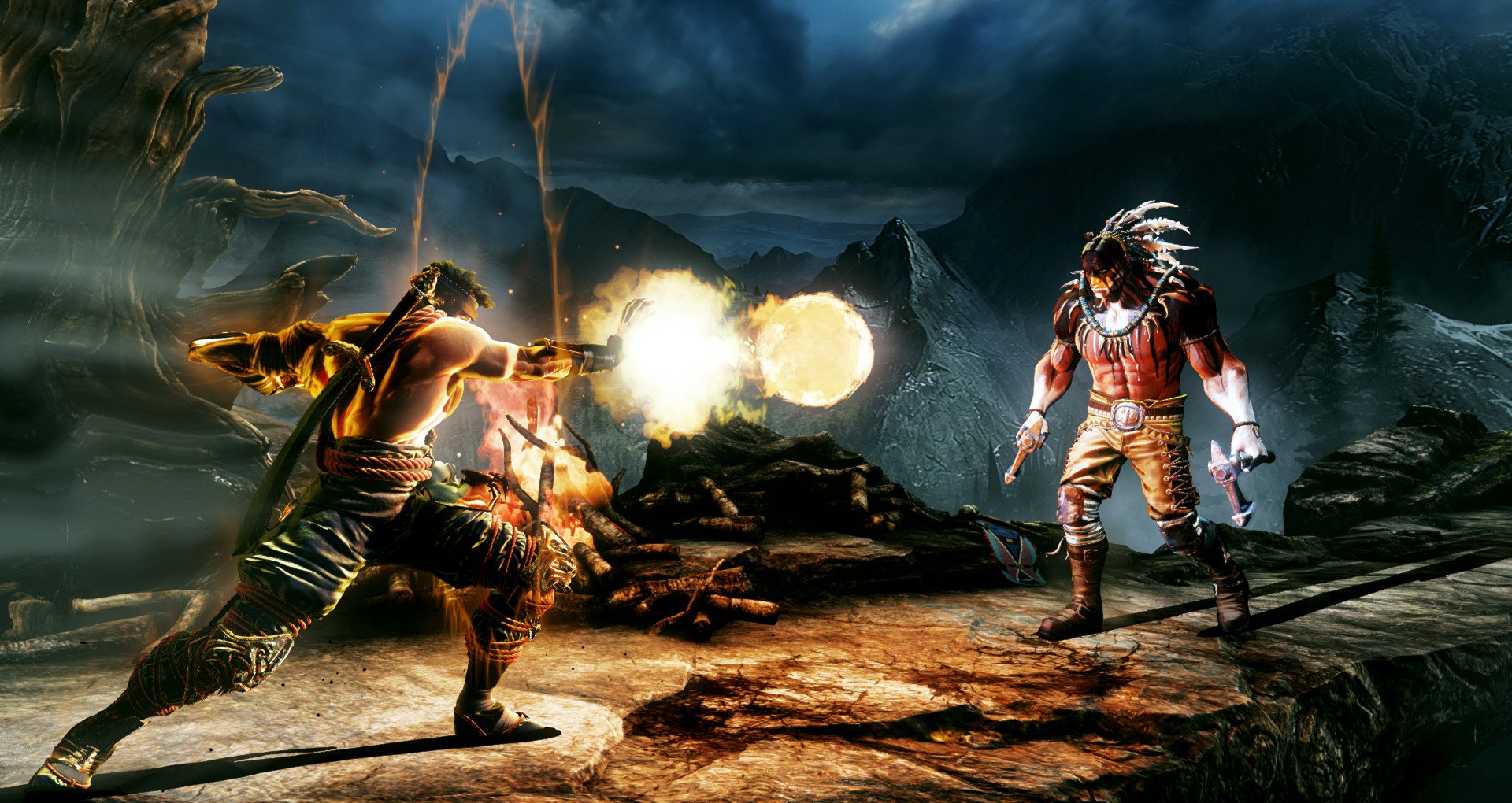
Excellent mechanics and incredible playability make up for Killer Instinct's shortage of single-player content. Franchise fans and fighting game junkies will be most pleased.
More info
| Genre | Fighting |
| Description | The classic monster-fighter returns. |
| Franchise name | Killer Instinct |
| UK franchise name | Killer Instinct |
| Platform | "Xbox One" |
| US censor rating | "Teen" |
| UK censor rating | "" |
| Alternative names | "KI3","Killer Instinct 3","Killer Instinct","KI" |
| Release date | 1 January 1970 (US), 1 January 1970 (UK) |
Lucas Sullivan is the former US Managing Editor of GamesRadar+. Lucas spent seven years working for GR, starting as an Associate Editor in 2012 before climbing the ranks. He left us in 2019 to pursue a career path on the other side of the fence, joining 2K Games as a Global Content Manager. Lucas doesn't get to write about games like Borderlands and Mafia anymore, but he does get to help make and market them.
